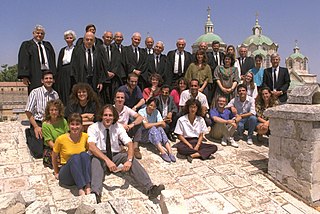Related Research Articles
A bar association is a professional association of lawyers. Some bar associations are responsible for the regulation of the legal profession in their jurisdiction; others are professional organizations dedicated to serving their members; in many cases, they are both. In many Commonwealth jurisdictions, the bar association comprises lawyers who are qualified as barristers or advocates in particular, versus solicitors. Membership in bar associations may be mandatory or optional for practicing attorneys, depending on jurisdiction.

The Supreme Court of India is the highest judicial court under the Constitution of India, the highest constitutional court, with the power of judicial review. Consisting of the Chief Justice of India and a maximum of 34 judges, it has extensive powers in the form of original, appellate and advisory jurisdictions. It is regarded as the most powerful public institution in India.

A law clerk or a judicial clerk is an individual—generally an attorney—who provides direct assistance and counsel to a judge in making legal determinations and in writing opinions by researching issues before the court. Judicial clerks often play significant roles in the formation of case law through their influence upon judges' decisions. Judicial clerks should not be confused with legal clerks, court clerks, or courtroom deputies who only provide secretarial and administrative support to attorneys and/or judges.

Rana Bahubhali Bhagwandas, was a senior judge and former acting chief justice of the Supreme Court of Pakistan (CJP). He enjoyed extremely high reputation as a judge. He remained the acting CJP during the 2007 judicial crisis in Pakistan, and also briefly became the acting Chief Justice of Pakistan when the incumbent Iftikhar Muhammad Chaudhry went on foreign tours in 2005 and 2006, and thus became the first Hindu and the third non-Muslim to serve as chief of the highest court in Pakistan. Rana Bhagwandas also worked as the Chairman of Federal Public Service Commission of Pakistan. He headed the interview panel for the selection of the federal civil servants in 2009.
Section 377 of the Indian Penal Code is a section of the Indian Penal Code introduced in 1861 during the British rule of India. Modelled on the Buggery Act of 1533, it makes sexual activities "against the order of nature" illegal. On 6 September 2018, the Supreme Court of India ruled that the application of Section 377 to consensual homosexual sex between adults was unconstitutional, "irrational, indefensible and manifestly arbitrary", but that Section 377 remains in force relating to sex with minors, non-consensual sexual acts, and bestiality.

The Faculty of Law, University of Delhi is the law school of the University of Delhi, a central university established by an Act of Parliament and under the direct purview of the Department of Higher Education (DHE) under Ministry of Human Resource Development (MHRD).

Lesbian, gay, bisexual and transgender (LGBT) people in India may face legal and social difficulties not experienced by non-LGBT persons. The country has repealed its colonial-era laws that directly discriminated against gay sex and transgender identification, but many legal protections have not been provided for including anti-discrimination laws and same-sex marriage.

Jagdish Sharan Verma was an Indian jurist who served as the 27th Chief Justice of India from 25 March 1997 to 18 January 1998. He was the chairman of National Human Rights Commission from 1999 to 2003, and chairman of the Justice Verma Committee Report on Amendments to Criminal Law after the 2012 Delhi gang rape case. He remains one of India's most highly regarded Chief Justices and eminent jurists.

Naz Foundation v. Govt. of NCT of Delhi is a landmark Indian case decided by a two-judge bench of the Delhi High Court, which held that treating consensual homosexual sex between adults as a crime is a violation of fundamental rights protected by India's Constitution. The verdict resulted in the decriminalization of homosexual acts involving consenting adults throughout India. This was later overturned by the Supreme Court of India in Suresh Kumar Koushal vs. Naz Foundation, in which a 2 judge bench reinstated Section 377 of the Indian Penal Code. However, even that was overturned by a 5 judge bench in Navtej Singh Johar v. Union of India in 2018, decriminalizing homosexuality once again.

Colin Gonsalves is a designated Senior Advocate of the Supreme Court of India and the founder of Human Rights Law Network (HRLN). He specializes in human rights protection, labour law and public interest law. He has been awarded Right Livelihood Award for the year 2017 for "his tireless and innovative use of public interest litigation over three decades to secure fundamental human rights for India’s most marginalised and vulnerable citizens." Considered a pioneer in the field of public interest litigation in India, he has brought several cases dealing with economic, social and cultural rights. Most of these cases, decided by the Supreme Court, have been set as precedents.

Altamas Kabir was an Indian lawyer and judge, who served as the 39th Chief Justice of India.

Dalveer Bhandari is an Indian member of the International Court of Justice and was a judge of the Supreme Court of India.
Justice Ranjana Prakash Desai is former judge of the Supreme Court of India. She served as a Judge of Supreme Court of India from 13 September 2011 to 29 October 2014. Now, she has been appointed as Chairperson of the Appellate Tribunal for Electricity and assumed the charge on 1 December 2014.

Sharad Arvind Bobde is an Indian judge serving as the 47th and current Chief Justice of India.

National Legal Services Authority v. Union of India is a landmark decision by the Supreme Court of India, which declared transgender people to be a 'third gender', affirmed that the fundamental rights granted under the Constitution of India will be equally applicable to transgender people, and gave them the right to self-identification of their gender as male, female or third-gender. This judgement is a major step towards gender equality in India. Moreover, the court also held that because transgender people were treated as socially and economically backward classes, they will be granted reservations in admissions to educational institutions and jobs.
Meenakshi Arora is a lawyer designated as senior counsel practising at Supreme Court of India.

Women in law describes the role played by women in the legal profession and related occupations, which includes lawyers, paralegals, prosecutors, judges, legal scholars, law professors and law school deans.
Ashok Abhaiendra Desai was a former judge of the Bombay High Court and the Allahabad High Court. He also served as the first chief justice of the Uttarakhand High Court between 2000–2003.
Dr. Menaka Guruswamy is a Senior Advocate at the Supreme Court of India. She is a B.R. Ambedkar Research Scholar and Lecturer at Columbia Law School, New York. Guruswamy has been visiting faculty at Yale Law School, New York University School of Law and University of Toronto School of Law. She is known for having played a significant role in many landmark cases before the Supreme Court, including the Section 377 case, the bureaucratic reforms case, the Augusta Westland bribery case, the Salwa Judum case, Right to Education case among others. She is assisting the Supreme Court as Amicus Curie in the case pertaining to the alleged extrajudicial killings of 1528 persons in Manipur.
References
- 1 2 "Women lawyers have to work more to prove themselves: SC Judge Desai". Indian Express. 6 September 2014. Retrieved 6 September 2014.
- ↑ "Women have broken barriers of gender discrimination: SC judge". Zee News. 6 September 2014. Retrieved 6 September 2014.
| This article about government in India is a stub. You can help Wikipedia by expanding it. |